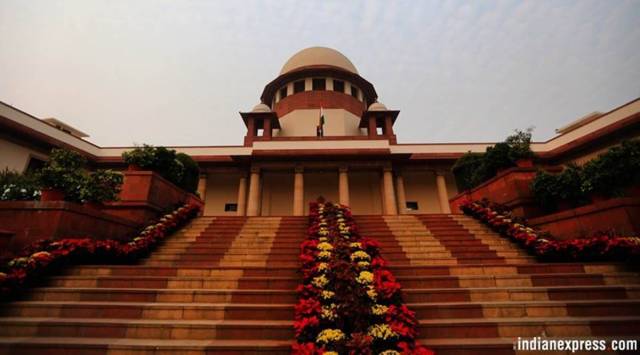In a first, Supreme Court begins live transcription of its hearings using AI
The Chief Justice of India D Y Chandrachud, while heading a Constitution Bench, pointed to a screen placed facing lawyers in his courtroom.
 The Supreme Court of India (File)
The Supreme Court of India (File) For the first time in its history, the Supreme Court on Tuesday started a system for testing live transcription of oral arguments using Artificial Intelligence (AI) tools and Natural Language Processing (NLP) technology.
Chief Justice (CJI) D Y Chandrachud, while heading a Constitution Bench, pointed to a screen placed facing lawyers in his courtroom and said, “You can see a screen here. We are just trying to explore the possibility of live transcription of arguments in court. We had to do it in a live environment, so it is an experiment.”
The Bench, also comprising Justices M R Shah, Krishna Murari, Hima Kohli and P S Narasimha, had assembled to hear petitions arising from last year’s Shiv Sena fallout in Maharashtra following differences between the Uddhav Thackeray and Eknath Shinde factions.
Stating that the record would be a “huge resource” for both lawyers and law students, the CJI added, “We will just see how it works, at least in the Constitution Bench matters. Then we will have a permanent record of arguments, which will of course help the judges and lawyers, but also our law colleges. They can analyse how matters are argued … huge resource.”
“Truly a court of record, because every word is recorded,” said Justice Narasimha.
CJI Chandrachud said there may be a problem when two or more lawyers argue at the same time but sought to assure the Bar that even that issue will be sorted.
“The only thing is that if there are two or more voices at the same time, that causes a little bit of a problem. But they obviously have personnel who will clean up the errors by the evening. They suggested that during the course of the day, the counsel will get a link so the counsel can look at it. By evening, they would have cleaned up the transcript and given it to us,” he said.
Justice Narasimha pointed out, “In virtual court proceedings, anybody who wants to interrupt would [have to] lift their finger so that there is no crosstalk.”
He added that the same method could be followed in physical hearings too, so that there is no overlap of voices.
Solicitor General Tushar Mehta and Senior Advocate Kapil Sibal, who were present in the court for the Maharashtra matter, welcomed the move.
Sibal said even in the 1970s in New York, there was something called Examination Before Trial (EBT) proceedings, and they would record everything that was said in the course of that examination.








